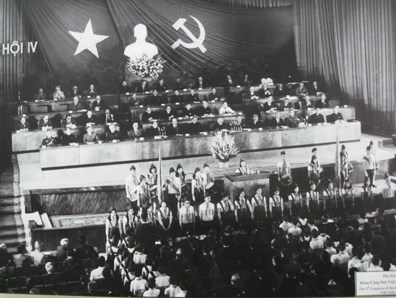Fourth National Party Congress
The fourth National Party Congress held from December 14-20, 1976, reviewed the resistance war against the US imperialists for national salvation, and guiding the nation towards socialism.
 The fourth National Party Congress held from December 14-20, 1976 (Photo: File photo)
The fourth National Party Congress held from December 14-20, 1976 (Photo: File photo)Hanoi (VNA) - Since its establishment, the Communist Party of Vietnam has held 11 Congresses. Each Congress is considered an important historical milestone in recognising the Vietnamese revolution’s victories, achievements and lessons.
The fourth National Party Congress held from December 14-20, 1976, reviewed the resistance war against the US imperialists for national salvation, and guiding the nation towards socialism.
With the 1975 Spring General Offensive and Uprising, with the historic Ho Chi Minh Campaign as it peak, under the leadership of the Party, our people made a great victory: completely liberating the South and reunifying the country. Vietnam’s revolution entered a new stage. For the first time, in a peaceful, independent and unified country, the people from all regions were eager to join in the general election, electing a common National Assembly of the entire nation.
In an enthusiastic and hopeful atmosphere, the fourth National Party Congress took place in Hanoi from December 14-20, 1976. As many as 1,008 delegates representing more than 1.55 million Party members nationwide and 29 international delegations attended the congress.
The congress summed up our people’s anti-US resistance war for national salvation, drew up major lessons covering a wide range of diverse and profound contents, and affirmed the entire nation’s revolutionary path towards socialism. Guidelines and policies throughout this period focused on promoting national reconciliation; conducting socialist reforms; healing the wounds of the war; gradually restoring and developing the economy, society, culture and education; building infrastructure of socialism; strengthening national defence, maintaining political security and social order, and strengthening the Party building work to enhance the Party’s leadership and combating capacity during the new period. The congress decided that speeding up the socialist industrialistion was a key task of the entire period of transition to socialism.
The congress decided to rename the Vietnam Workers’ Party the Communist Party of Vietnam and adopted the Party’s new Statutes. The congress restored the post of General Secretary instead of First Secretary and elected a Central Committee, consisting of 101 official and 32 alternate members. The Political Bureau comprised 14 official and three alternate members. Comrade Le Duan was elected as General Secretary.
The fourth National Party Congress was of extremely important significance: It was the congress of the victory of the national liberation and reunification cause that steered the entire nation in the process of socialist construction.(to be continued).-VNA











